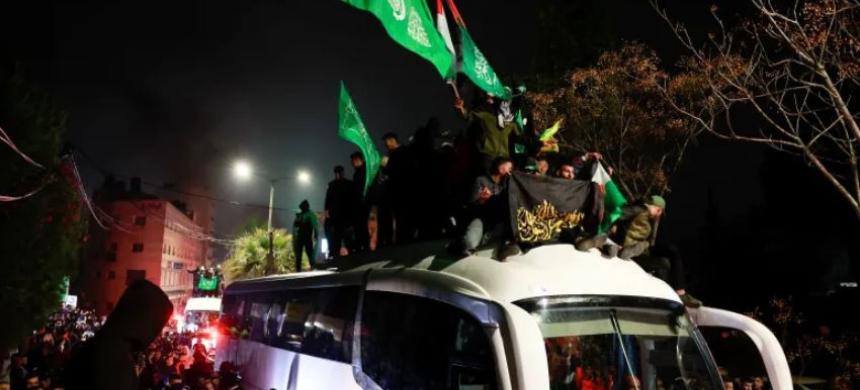On Sunday, Hamas released three Israeli hostages, while Israel freed 90 Palestinian prisoners, marking the first day of a ceasefire halting a 15-month war that has devastated Gaza and escalated tensions across the Middle East.
The truce allowed Palestinians to return to their ruined neighborhoods and begin rebuilding, while aid trucks brought in vital supplies. In other parts of Gaza, crowds cheered as Hamas fighters emerged from hiding.
Fireworks lit up the sky as buses carrying freed Palestinian prisoners arrived in Ramallah on the West Bank, where thousands awaited their return. Among those released were 69 women and 21 teenage boys from the West Bank and Jerusalem, according to Hamas.
In Tel Aviv, hundreds of Israelis gathered outside the defense headquarters, tearfully watching a live broadcast from Gaza as three female hostages were escorted into a Red Cross vehicle by Hamas fighters.
The Israeli military confirmed the safe release of Romi Gonen, Doron Steinbrecher, and Emily Damari, showing them in good health in a video. Damari, who had lost two fingers when she was shot on the day of her abduction, smiled and embraced her mother while holding up her bandaged hand.
“I want you to tell them: Romi, Doron, and Emily – an entire nation embraces you. Welcome home,” Prime Minister Benjamin Netanyahu said during a phone call with a commander.
At Sheba Medical Center, the women were reunited with their families in emotional scenes, with Damari wrapped in an Israeli flag. They were among over 250 people kidnapped and 1,200 killed in the Hamas raid on Israel on October 7, 2023, as stated by Israel.
In retaliation, over 47,000 Palestinians have died in Israeli strikes, with nearly the entire 2.3 million population of Gaza now homeless. Around 400 Israeli soldiers have also been killed.
The ceasefire agreement includes halting combat, delivering aid to Gaza, and the release of 33 Israeli and foreign hostages over six weeks in exchange for nearly 2,000 Palestinian prisoners. Many hostages are feared dead.
In northern Gaza, Palestinians navigated through a devastated landscape of rubble from the war’s most intense fighting.
“I feel like I’ve found water in the desert after being lost for 15 months,” said Aya, who had been displaced from her home in Gaza City.
The first phase of the ceasefire was delayed by three hours, during which Israeli airstrikes and artillery targeted Gaza, resulting in 13 deaths, according to Palestinian health officials. Israel claimed that Hamas delayed providing the list of hostages to be freed, while Hamas attributed the delay to technical issues.
“Today, the guns in Gaza have gone silent,” U.S. President Joe Biden said on his last day in office, acknowledging a truce that had eluded U.S. diplomacy for over a year. “We reached this point due to the pressure Israel put on Hamas, with backing from the United States.”
Read More: Ceasefire Between Israel and Hezbollah Officially Takes Effect
The truce allowed Hamas to emerge from its underground hiding after 15 months. In some areas, Hamas police in blue uniforms appeared, and armed fighters drove through Khan Younis, where crowds cheered, “Greetings to Al-Qassam Brigades,” the group’s military wing.
Despite the ceasefire, tensions remain high as there is no clear plan for Gaza’s governance post-war. Israel has made it clear that it will resume fighting if Hamas is not fully dismantled.
Hardline figures in Israel’s government, such as National Security Minister Itamar Ben-Gvir and Finance Minister Bezalel Smotrich, have expressed opposition to the ceasefire, with Smotrich threatening to resign if the war ends without Hamas being fully destroyed.
The ceasefire began on the eve of U.S. President-elect Donald Trump’s inauguration. Trump’s designated national security adviser, Mike Waltz, said that should Hamas violate the ceasefire, the U.S. would support Israel in taking action. “Hamas will never govern Gaza. That is completely unacceptable,” he added.
In Gaza City, streets were filled with people waving Palestinian flags and documenting the scenes on their phones. Carts loaded with belongings navigated streets littered with debris.
Ahmed Abu Ayham, 40, from Gaza City, said that despite the truce saving lives, the overwhelming losses and destruction made it no time for celebration. “We are in deep pain, and now is the time to hug each other and cry,” he said.











